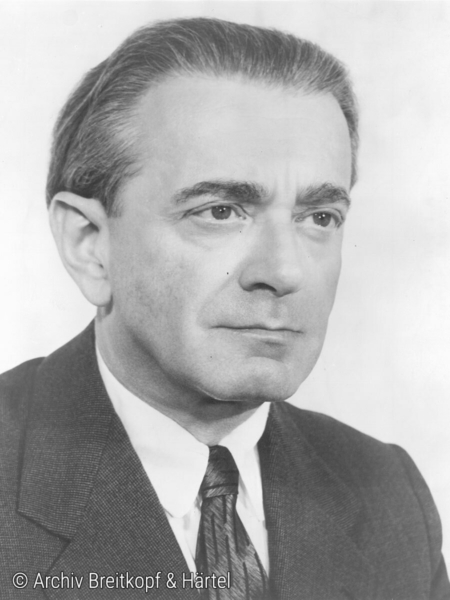Miklós Rózsa (1907–1995)
Miklós Rózsa (in Budapest geboren) zeigte eine frühe Neigung zur Musik und begann im Alter von fünf Jahren mit dem Erlernen des Violinspiels. Nach dem Schulabschluss ging er nach Leipzig, um seine musikalische Ausbildung zu vervollständigen.
Am Leipziger Konservatorium studierte er Komposition bei Hermann Grabner, dem Nachfolger Max Regers. Er war gerade erst 21 Jahre alt, als der Musikverlag Breitkopf & Härtel mit der Veröffentlichung seiner ersten Werke begann, die schon bald die Aufmerksamkeit der Musikwelt auf sich zogen.
Nach einem Konzert mit seinen Kammermusikwerken in Paris ließ Rózsa sich 1933 in der französischen Hauptstadt nieder. Dort komponierte er „Thema, Variationen und Finale" op. 13, das unter Charles Munch seine Uraufführung erlebte. Weitere Darbietungen folgten bald: durch Bruno Walter in Amsterdam, Georg Solti in Frankfurt sowie weitere führende Dirigenten in Europa. Leonard Bernstein legte 1943 sein Dirigentendebut bei der Aufführung von Rózsas op. 13 mit dem New York Philharmonic Orchestra ab.
Miklós Rózsa erhielt 1937 und erneut 1938 den ungarischen Franz Josef-Preis für Komposition. 1938 wurden auch seine „Three Hungarian Sketches" op. 14 im Rahmen des Internationalen Musikfests in Baden-Baden präsentiert. In den USA führten Stokowski, Ormandy, Coates und Hans Lange dieses Stück auf.
Miklós Rózsa kam 1940 in die USA und wurde 1946 amerikanischer Staatsbürger. 1943 heiratete er Margaret Finlason. Aus der Ehe gingen zwei Kinder hervor, Juliet und Nicholas. Im Jahr 1945 wurde er Mitglied der Fakultät der University of Southern California.
Auf Einladung Alfred Wallensteins leitete Rózsa 1945 das Los Angeles Philharmonic Orchestra bei der weltweit ersten Aufführung seines Konzerts für Streichorchester op. 17. Anlässlich der europäischen Erstaufführung dirigierte Albert Coates das London Symphony Orchestra.
Drei Jahre später erfolgte durch den Chor der First Methodist Church of Hollywood die Uraufführung von Rózsas Motette für gemischten Chor „To Everything There is a Season" op. 21. Das Compinsky-Quartett stellte 1951 sein Streichquartett Nr. 1 op. 22 vor. 1956 wurde Miklós Rózsas Violinkonzert op. 24 unter Jascha Heifetz in Dallas, Texas, zum ersten Mal aufgeführt. Spivakovsky, Zsigmondy und Goldenberg spielten dieses häufig in Europa und Amerika.
Eugene Ormandy und das Philadelphia Orchestra brachten 1957 erstmals „The Vintner's Daughter" op. 23a zu Gehör. Außerdem fand in diesem Jahr die Uraufführung der Konzertouvertüre op. 26 unter der Leitung des Komponisten in Düsseldorf statt. Walter Hendl in Dallas war für die amerikanische Erstaufführung verantwortlich; das Los Angeles Philharmonic folgte unter der Leitung von John Barnett.
Sein Klavierkonzert op. 31 wurde 1967 von Leonard Pennario und dem Los Angeles Philharmonic Orchestra unter Zubin Mehta uraufgeführt. Janos Starker bestritt 1971 die Uraufführung des Cellokonzerts op. 32 mit Georg Solti und dem Chicago Symphony Orchestra.
Die weltweit erste Aufführung des Violakonzerts op. 37 bot Pinkus Zukerman 1979 mit dem Pittsburgh Symphony Orchestra unter André Previn dar. Im selben Jahr wurde Rózsa die Ehrendoktorwürde durch das Wooster College verliehen; elf Jahre später erhielt er diese Auszeichnung auch von der University of Southern California.
Neben seiner Karriere als Komponist von Konzert- und kammermusikalischen Werken gilt Miklós Rózsa seit langer Zeit als einer der renommiertesten und erfolgreichsten Filmmusik-Komponisten. In diesem Karrierefeld betätigte er sich seit 1937, als er von Alexander Korda den Auftrag erhielt, in London die Filmmusik zu „Knight Without Armour" zu schreiben. Unter den von da an bis 1981 verfassten Kompositionen befinden sich drei, für die er Academy Awards erhielt: „Spellbound" (1945), „A Double Life" (1946) und „Ben-Hur" (1959). 1978 wurde er für den Soundtrack zu Alain Resnais' Film „Providence" mit dem französischen César ausgezeichnet. Unter seinen erfolgreichsten Filmmusik-Kompositionen befinden sich: „The Thief of Baghdad" (1940), „Double Indemnity" (1944) und „El Cid" (1960).
Die Konzertversionen seiner Filmmusiken – beispielsweise „Jungle Book", „Ben-Hur" und die „Quo Vadis Suite" – sind beliebte zeitgenössische Werke. Miklós Rózsa trat häufig beim Dirigat seiner eigenen Kompositionen in den USA und im Ausland in Erscheinung.
In der Syracuse University Library in New York wurde eine Miklós Rózsa-Sammlung eingerichtet.
Miklós Rózsa starb 1995 in Hollywood.
(Text der Miklós Rózsa Society, deutsche Übersetzung: Gwendolyn Döring)









